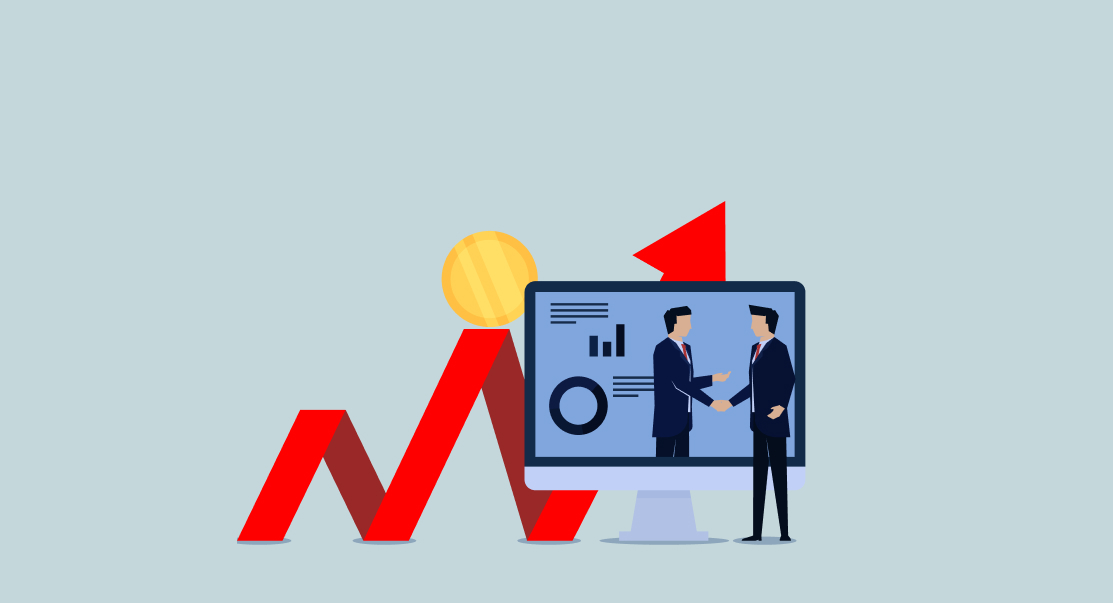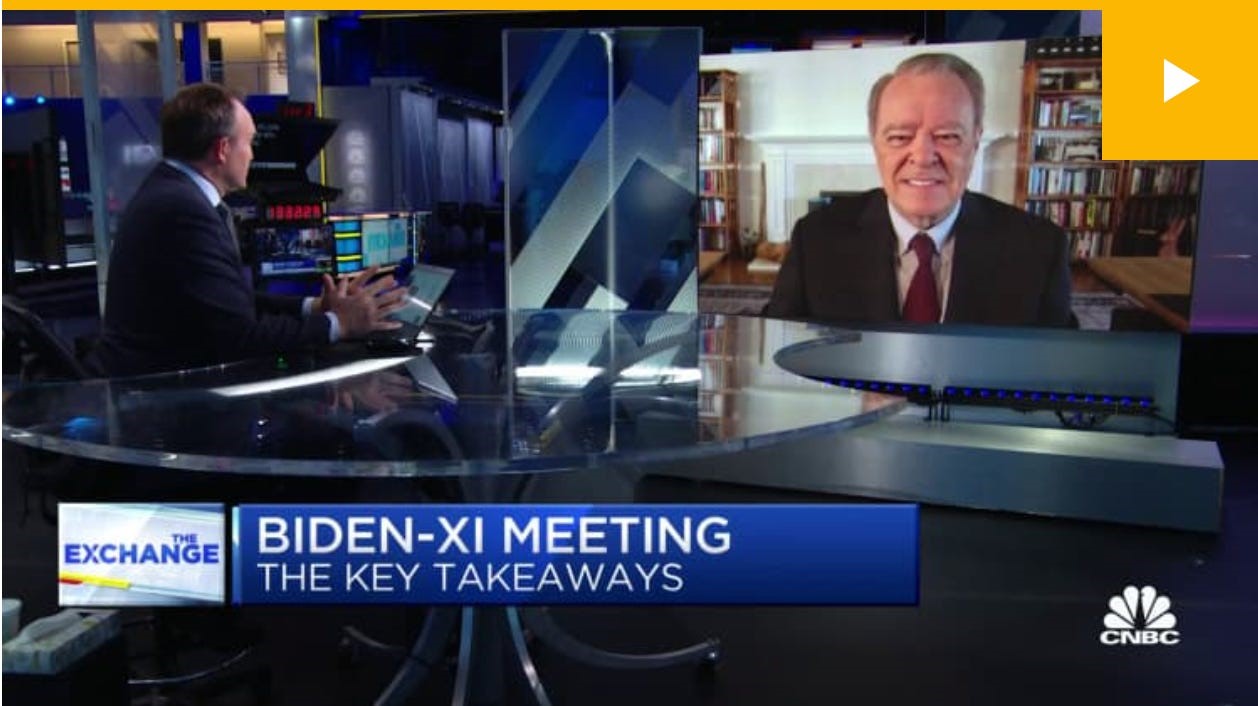CNBC Exchange with Brian Sullivan


Summary: On Monday, I spoke with Brian Sullivan, my friend of many years and Anchor of CNBC’s The Exchange, about the Biden/Xi meeting in Bali. The two leaders— both old pros who have known each other for 11 years—did all the right things to give the world a much-needed sigh of relief. Biden gave Xi what he wanted, assurances that US policy toward Taiwan had not changed. Xi gave Biden what he wanted, a joint statement that it was unacceptable for anyone (that means you, Vlad) to use threats of nuclear warfare to extort cooperation from other nations. Below, I have posted the talking points that I prepared for the producers to brief Brian before the interview. You can watch the short video clip of the interview by clicking here.
I’m to Dubai tomorrow to have a fireside chat about geopolitical risk with my old friend Nouriel Roubini in front of a ballroom filled with family office billionaires. (Something tells me Nouriel is going to be pessimistic.) I will write about what I learn there and on my recent trip to Riyadh for the “Davos in the Desert” meetings in a few days.
Rutledge Talking Points, The Exchange, 11/14/22:
- Summary comments
- Monday was a very good day for almost everyone. (except for Vlad or the kid in Pyongyang with the bad hair.)
- Sleepy Joe? The guy is a stud/warrior. He worked 5 summit meetings in one week, one in Egypt, 2 in Cambodia, the G20 in Bali, and APAC in Bangkok. Oh, and while he was flying he won control of the Senate too. Not bad for an old guy.
- Xi didn’t have Biden forcibly removed from the meeting like he did with Hu Jintao in Beijing. Dodged a bullet there, Joe.
- The optics were the objective and just what you expect from 2 old pros. Both looked calm and rested. Xi actually smiled for the camera. (Never saw him smile before.) “Good to see you” from both men, followed by a three-hour meeting. All this was telegraphed in a series of lower-level meetings in the days before Bali designed to show a “thawing” of the relationship. China announced a set of major property market support measures and a relaxation of Zero-COVID rules just before the meeting. Blinken will travel to China in the weeks ahead. Yellen will meet Yi Gang (PBOC) later this week on COVID/economic issues. And remember they are both playing for their home audiences. US and Chinese press releases don’t have to say the same thing because most Americans don’t read Mandarin.
- Key points
- Positive discussion of the soft issues; trade, climate, health, food security that doesn’t commit anybody to do anything.
- Joint statement that it is not OK to use nukes, or threats of nukes, was an unexpected scolding for Vladimir Putin. This is a big win for Biden.
- Yellen’s remarks on oil ahead of the meeting, that the US not opposed to China buying Russian oil as long as it is cheap is a big win for Xi.
- Differences Remain
- Xinjiang/HK/Tibet human rights issue isn’t going away as attested by the containers of boycotted Chinese solar panels piling up in US ports.
- Taiwan still difficult but near-term worries reduced. Both countries need access to Taiwanese supplies of semiconductors to run their economies.
- North Korea. This is complicated due to Chinese history but incentives align to try to contain the destructive young man in Pyongyang. So far his missiles have only killed fish. (Personal note: some years ago I got to take part in secret negotiations in Pyongyang. Needless to say, we failed. Hope to write the story some day.)
- Advanced semiconductors, equipment sales restrictions very important to Xi’s plans for China. No progress on this at all.
- Investing in China (for our viewers who are not investment professionals)
- Don’t. Nothing fundamental has changed here.
- Still a place run by an autocrat with no rule of law and bad audits. Decisions made by one man means the Central Limit Theorem—the Law of Large Numbers—does not apply.
- If you want to bet on rising Chinese growth, do it through surrogates in places with laws and judges in long black robes. For example, BHP/RIO are good ways to bet on Chinese growth and energy demand.
- Don’t touch the property market. It is a mess.
- Don’t buy Chinese tech stocks either. Xi still doesn’t like rich guys like Jack Ma having influence. There is only room for one power center in China—him.
- But the meeting will be positive for the markets here, especially the energy sector.
- Although COVID cases in China are spiking this week, loosening Zero-COVID rules in China will relax supply chains and increase Chinese growth in the coming months. Counterintuitively, this will reduce US inflation by making it easier for US firms to produce and ship products. And it should give the Fed a good excuse for putting their mike down and backing away slowly from their disastrous Quantitative Tightening policy.
- Summit meetings are nice, but they don’t change the fundamental landscape for investors. We will be living with Long COVID for a long time.
- By Long COVID, I am not referring tobrain fog or other physical symptoms. As Nobel Prize winner Eric Kandel showed, prolonged exposure to fear makes lasting changes in the physical structure of brains. People are scared and demoralized after three years of pandemic. They will remain that way for a long time. Scared people make bad decisions and freak out easily. That makes markets volatile and unstable.
- Pandemics and plagues, in history, have been followed by long periods of “lawlessness”, as Thucydides wrote about Athens/Sparta and Camus wrote inThe Plague. These conditions encourage the kind of conspiracy theories and conflict that have infected US politics, resulting in contested elections and lack of trust in institutions.
- Many recent examples of violence and instability support this idea. There are ongoing riots in Iran. Two weeks ago, Foxconn workers broke out of their locked-down facility in China after rumors circulated that they were being used as guinea pigs in a government COVID experiment. Fake end-of-Zero-COVID posts in China created a huge swing in Chinese and Hong Kong stock prices. Fake social media stories this week about Lilly and Lockheed caused a sharp drop in their stock prices. (I bought some of both.) Expect more of the same in the months ahead.
Dr. John
The views and opinions expressed in this article are those of Dr. John Rutledge. Assumptions made in the analysis are not reflective of the position of any entity other than Dr. Rutledge’s. The information contained in this document does not constitute a solicitation, offer or recommendation to purchase or sell any particular security or investment product, or to engage in any particular strategy or in any transaction. You should not rely on any information contained herein in making a decision with respect to an investment. You should not construe the contents of this document as legal, business or tax advice and should consult with your own attorney, business advisor and tax advisor as to the legal, business, tax and related matters related hereto.
